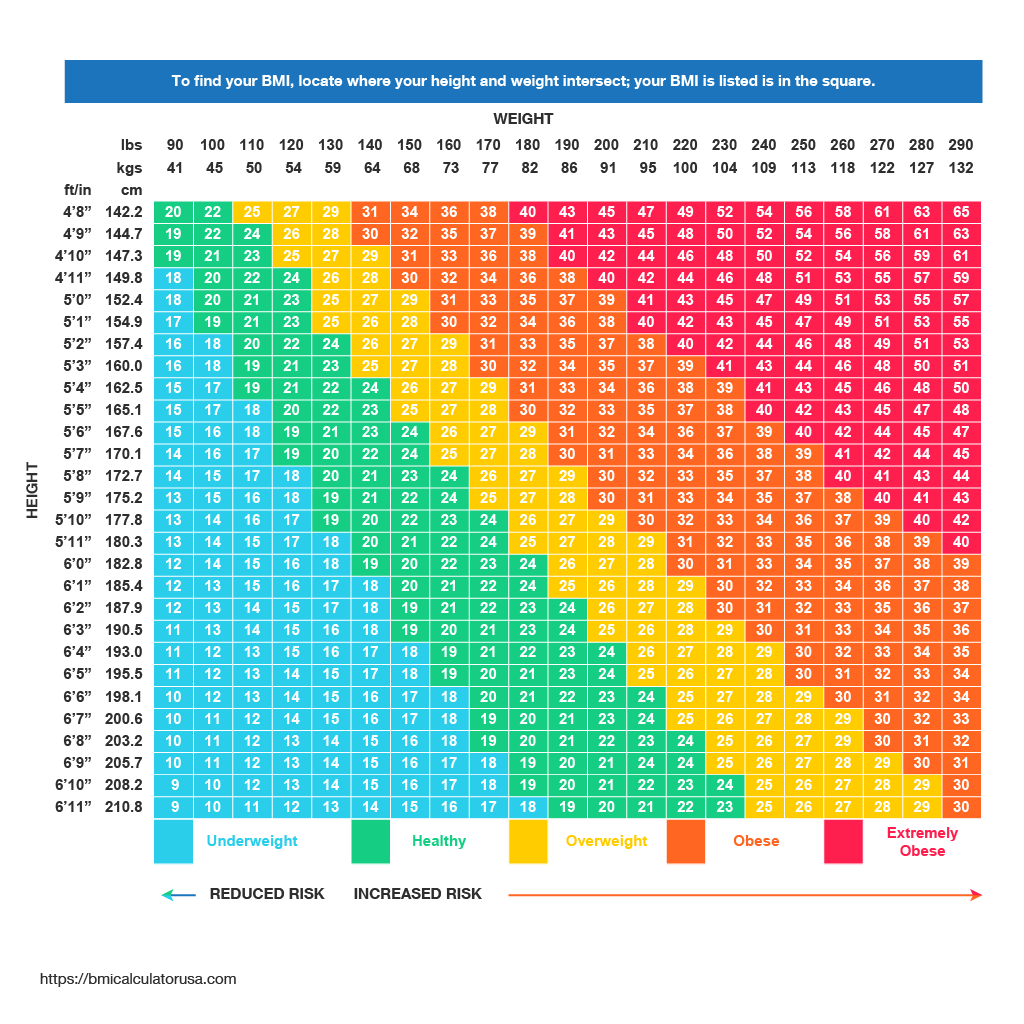
Unbeknown to many people, there are a number of awesome calculators and references online that can helps us meet our health and fitness goals, whether that’s losing weight, gaining weight, or calculating repetition ranges with different exercises. Today I want to share a few of the most popular ones and the ones I have personally found most helpful. My goal for this post is to make you aware of some of the free resources out there and to serve as a reference. Let me know your personal favorites down below and I may update this post to include them.
Body Mass Index (BMI)
BMI is a calculation that many of you are familiar with. It is probably the main tool your doctor uses to assess the health of your weight. BMI is based on two inputs: height and weight. Readings of 18 and below is underweight. 19-24 is healthy. 25-29 is overweight. 30-39 is obese. And 40 and up is extremely obese. You can reference the chart below or plug your numbers into BMI Calculator USA, which will give you an exact reading. BMI has its shortcomings. For example, Michael Jordan in his prime had a BMI of 27-29, which would classify him as overweight, yet his weight size was ~30. That is because muscle is quite heavy (it weighs more than fat) and BMI doesn’t factor in training-induced increases in muscle mass. If you are an athlete with high muscle mass, then BMI is probably not the best measure for you. For most people, however, BMI is an effective tool to gauge the health of their weight.

Weight Loss & Weight Gain Calculators
Did you know that a pound is ~3,500 calories? That means if you want to gain/lose a pound a week you need to increase/decrease your calorie intake by 3,500/7 = 500 calories a day. For example, if you need 2,200 calories a day to maintain your current weight and want to drop a pound a week (holding physical activity levels the same), then you would need to eat 1,700 calories a day. There are calculators where you input height, weight, sex, age, and physical activity levels and they calculate exactly how many calories you need to eat to maintain your current weight or drop x amount of pounds per week.
Calculator.Net has a great simple tool for this purpose –> CNET Weight Loss/Weight Gain Calculator. Another great one is at Calculators.org –> CORG Weight Loss/Weight Gain Calculator. The CORG calculator has the added feature of allowing you to input how many pounds you want to lose/gain in x amount of time, and calculating exactly how many calories you need to eat a day to achieve it.
FYI, there was a 30-calorie difference in how much I should eat in a day to maintain my current weight between the two calculators above. That is because no two calculators use the exact same algorithm and there is some estimation involved. In general, these are very helpful tools based on math and science but don’t take every minute reading as the absolute truth.
Resistance Training Calculators (Bench, Squat, Deadlift, Etc.)
There are also calculators that estimate how many repetitions of an exercise you can do at unspecified weights based on how many repetitions you can do at a specified weight. Bodybuilding.com has one for any lift–> Bodybuilding One-Rep Max Calculator. Most people use tools like this calculate their one-rep max as a measure of overall strength, hence why Bodybuilding.com brands the calculator as a “one-rep max calculator.” However, you can also use it to calculate, your 3, 5, and 8-rep maxes. For example, if you input 200 pounds for 8 repetitions, the calculator will churn out 250 as a one-rep max. However, there is also a chart at the bottom that estimates how many reps you can do at other weight based on your one-rep max (e.g. you can do 95% of one-rep max for two reps; 90% of one-rep max for 4 reps; and and 80% of one-rep max for 8 reps.) So if my one rep max is 250, 80% of that is 200, which would mean I can do 200 lbs for an estimated 8 reps. The calculator above gives you all of these numbers.
Strength Level is another popular tool to calculate your strength relative to other bodybuilders in your sex/age group. –> Strength Level Calculator You input your personal data, the exercise in question (there are dozens), and the number of repetitions you can do at a given weight, and it will tell you where you stand relative to your peers. There are five divisions based on each individual exercise: beginner, novice, intermediate, advanced, and elite. For example, I may rank as advanced on the bench press and novice on the squat if my bench numbers are relatively high and my squat numbers are relatively low.
Note: Strength Level uses self-reported data from users (currently 150,000 submissions) to calculate averages. The website “filters” submissions from spam, but in my experience people still tend to inflate their lifts, so take it with a grain of salt. And, remember, at the end of you day you are your only competition.
